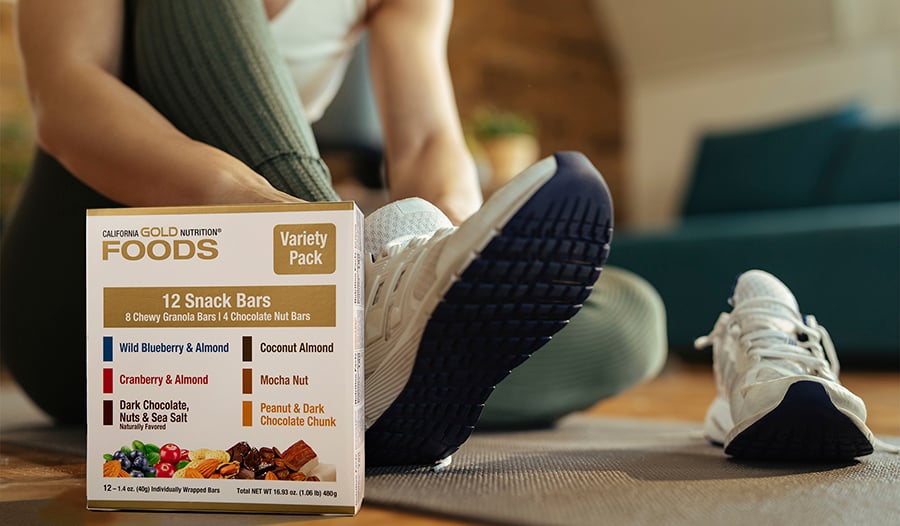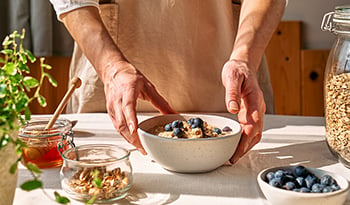Starting a New Workout Routine? 7 Nutrition Tips from a Dietician

Implementing a new workout routine can bring amazing benefits, like weight loss, lowered stress levels, and improved circulation, just to name a few. Whether you are adding in daily walks, incorporating some resistance exercise, or enjoying group fitness classes, all forms of exercise benefit your health.
To maximize the effort you are putting into your new workout routine, it is important to pay attention to nutrition as well. Sure, getting your heart rate up and pumping iron will go a long way towards improving your physical and mental health and wellness, but complimenting a consistent workout routine with proper nutrition can help you get even more out of the exercise you do.
Here are my top 7 nutrition tips to help you maximize your efforts in the gym.
1. Pre-Workout Fuel
In most cases, eating before exercise is essential to keep up your energy, provide adequate nutrients to your working muscles, and maintain healthy blood sugar levels. Depending on how long you have to digest your food before you start your exercise, there are a few different ways to properly fuel yourself.
If you are eating less than an hour before your workouts like if you work out first thing in the morning, keep your fuel source simple. A serving of dried fruit or a snack bar are great options here because they are dense in carbohydrates and easy to digest. Be sure to choose options low in fat, protein, and fiber, as those nutrients are more likely to cause digestive discomfort while exercising.
If you have one to two hours between fueling and exercising, you can include more food and nutrients in your pre-workout snack. A slice of whole-grain toast with nut butter and a banana or a serving of cereal with milk are both good options when you have a bit more time to digest your food before getting your heart rate up.
In both timing scenarios, it is important to focus on carb-dense foods that will digest easily and help support your energy needs while exercising.
2. Fuel Your Exercise
If you plan to exercise for more than 60 minutes consecutively, it is important to fuel your body while you are working out. Like your pre-workout food source, this food source should also be carb-dense but should provide even less protein, fat, and fiber than what you eat before your workout.
Energy chews are a great fuel source during exercise, especially higher heart rate, cardio-style workouts, like running. They are easy to transport and contain easy-to-digest carbs. Some options contain caffeine, which may improve performance—but be sure to read the nutrition facts and ingredients if you are sensitive to caffeine.
For those who regularly engage in moderate heart rate activity for more than an hour, energy bars that are dense in carbs with small amounts of protein and fat are a good option. Because of your lower heart rate during exercise, you should be able to digest these small amounts of fat and protein, and they may even help sustain your energy.
If your exercise will last fewer than 60 minutes, you likely don’t need to fuel during your workout—just be sure to eat your pre- and post-workout snacks to get adequate fuel before and after your exercise.
3. Recovery Nutrition
While carbohydrate is the most important nutrient before and during exercise, protein becomes the focus after your workout. Protein is essential in aiding the repair and recovery of muscle tissue and, ideally, should be consumed within 45 minutes of finishing your exercise. During this time frame, your muscles are most receptive to the nutrients in your recovery nutrition.
Luckily, there are many convenient, easy ways to get your protein:
- Protein powders: Combine protein powders with water or a milk of your choice for a protein and hydration boost.
- Protein bars: Another easy source of protein after workouts, protein bars come in many different flavor varieties and ingredient combinations, so there is truly something for everyone. Just be sure to watch the sugar content in these bars to maintain a well-balanced nutrient intake.
- Jerky: When you’re on the go and need something quickly after your workout, jerky is a great source of protein.
4. Hydration
Fueling and recovering with proper nutrition is important for getting the most out of your workouts—but hydration is just as essential to keeping you healthy and strong while you exercise.
We all require varying amounts of hydration to avoid becoming dehydrated, but a good rule of thumb I recommend is for women to get at least 80 ounces of total fluid per day, while men should get at least 110 ounces. At least half of your total fluid intake should come from plain water to maximize your hydration. The rest of your fluid intake can come from various beverages, including sparkling water, tea, and milk.
Begin every workout well-hydrated and be sure to drink water throughout your exercise to make up for the fluid you lose through sweat. Reusable bottles are a great way to stay on top of your fluid intake and are more environmentally friendly than disposable bottles. Opt for an insulated bottle to help keep your beverage cold for a more refreshing drink during those hot and sweaty workouts.
5. Electrolytes
In addition to keeping up with your hydration as you begin a new workout program, it is essential to stay mindful of your electrolyte consumption as well. These minerals serve many functions in the body, but two of their main roles are to maintain fluid balance and aid in hydration.
While electrolytes are found in a wide variety of foods, from processed items to fresh fruits and vegetables, you may need a more concentrated source of electrolytes from a supplement, especially during and following workouts in hot and humid environments. As you sweat, you lose fluid and electrolytes, so it is important to replace both to maintain good health and to support your muscle tissue. You can add electrolyte supplements to your water to enjoy during and after exercise or throw them into a post-workout smoothie that provides protein as well.
6. Manage Inflammation
Exercise is great for the body and can lead to many benefits, including weight loss, improved circulation, and lower blood pressure. However, exercise can also induce some inflammation in the body, especially for those doing intense and high-impact exercise.
While we may not all engage in this intense form of exercise, there are still benefits to managing inflammation in your body with food and supplements. Healthy omega-3 fatty acids are abundant in fatty fish, like salmon and tuna, but supplements may be one of the most convenient ways to consume this anti-inflammatory nutrient.
Additionally, if you notice joint pain while exercising or consistently throughout your day, you may benefit from a joint health supplement. These contain a variety of nutrients, like glucosamine, chondroitin, and MSM, all thought to aid in alleviating joint pain.
Lastly, curcumin, a compound found in turmeric, may help reduce inflammation in the body, so adding a supplement to your routine or using fresh or powdered turmeric in cooking may be beneficial.
7. Performance Enhancers
Nutrition, hydration, and supplements go a long way in complementing any workout routine, but there are a few additional items that can help you get even more out of your workouts.
- Cherry juice: Beyond being delicious, cherry juice is abundant in antioxidants that may support your cellular health and combat damaging free radicals. Cherry juice may also help reduce inflammation and improve sleep quality.
- Caffeine: This compound may enhance athletic performance by boosting your energy, helping you feel more alert, and reducing the onset of fatigue. A cup of coffee or green tea 30 minutes to one hour before your workout may help you get more out of each rep and mile.
- L-Arginine: A precursor to nitric oxide, a compound made naturally in your body that helps dilate blood vessels, this amino acid may improve blood and oxygen delivery to your muscle tissue and lead to more productive exercise.
Takeaway
When beginning a new workout routine, maximize the gains from your efforts by optimizing your workout nutrition. By considering how you fuel yourself before, during, and post-workout, you can maintain your energy, give your muscles what they need to perform, and get the most out of your exertion.
Feeling overwhelmed by these suggestions? It is okay to pick just one or two components and start there. Over time, you can add in additional habits to create a well-rounded approach to exercise that supports many different areas of your body.
High fives to you for starting a new workout routine! Be sure to include variety in your exercise, engage in activities you enjoy, and build in a support system of family, friends, and other exercisers who help keep you engaged in the process.
DISCLAIMER:This Wellness Hub does not intend to provide diagnosis...

















































































 Table of Contents
Table of Contents















